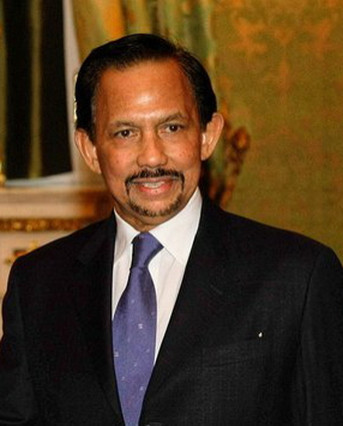Eye For An Eye, Tooth For A Tooth: Tiny Oil-Rich Sultanate Of Brunei To Introduce Harsh Sharia Law

The tiny sultanate of Brunei said it will impose a tough new penal code based on Islamic Sharia law – including the stoning to death of adulterers and amputation of limbs for theft – but assured the legislation will only apply to Muslims, effective in six months. Agence France Presse reported that other offenses, including alcohol consumption and abortion, will also be subject to significant punishments like flogging.
Brunei, a nation of less than 500,000 people on the northern edge of Borneo island, already has banned the sale and consumption of alcohol, suggesting it adheres to a stricter form of Islam than neighboring giants, Malaysia and Indonesia. Brunei, which is about 70 percent Muslim ethnic Malay, is a highly prosperous state due to its abundant oil and gas resources in the South China Sea; so wealthy in fact that its residents enjoy free medical care and education up to university level. The CIA/World Factbook noted that Brunei boasts a GDP per capita of $55,300, ranking it 11th highest in the world.
The Islamic codes were introduced by the autocratic leader of the state, 67-year-old Sultan Hassanal Bolkiah, one of the richest men on the planet. Among other measures, Hassanal has already made religious education compulsory for Muslim children and ordered stores to close on Friday for prayers. “By the grace of Allah, with the coming into effect of this [Sharia] legislation, our duty to Allah is therefore being fulfilled,” said the sultan, who initially called for the imposition of Sharia law as far back as 1996, reported the Associated Press.
Brunei's top Islamic scholar, Mufti Awang Abdul Aziz, assured at a legal conference that Sharia law "guarantees justice for everyone and safeguards their well-being." "Let us not just look at the hand-cutting or the stoning or the caning per se, but let us also look at the conditions governing them," Awang added. "It is not indiscriminate cutting or stoning or caning. There are conditions and there are methods that are just and fair." Awang also assured that foreign visitors to Brunei would not be vulnerable to Islamic justice. "Sir, do all potential tourists to Brunei plan to steal? If they do not, then what do they need to fear," he asked rhetorically. "Believe me when I say that with our Sharia criminal law, everyone, including tourists, will receive proper protection."
BBC reported that up until now, the Sharia courts already in place dealt only with personal and family law issues such as marriage and inheritance. Most civil legal matters fell under the purview of British law, a result of Brunei’s past history as a British protectorate until 1984.
The Sultan is an absolute monarch and his family has ruled Brunei for six hundred years. Two years ago, Forbes Magazine estimated his net worth at about $20 billion, which affords him an extraordinary affluent lifestyle, including a vast collection of luxury vehicles and gold-palaces.
The laws have already been criticized. Phil Robertson, deputy Asia director for the New York-based Human Rights Watch, told AFP the imposition of Sharia law reflects the fact that "respect for basic civil and political rights is near zero in Brunei.” Robertson added: "These rights-abusing policies are a good indication of why modern democracy and the right of people to participate in their government is a much better idea than anachronistic absolute monarchy.”
AFP reported that it was unclear how aggressively the new laws would be imposed, but noted that the government will give judges great latitude in applying such punishments. Brunei’s minorities comprise Buddhists, Christians and indigenous people. Moreover, some observers lament that the harsh nature of Sharia law contradicts the gentle nature of the Malay people. "[Sharia] seems almost incompatible with Malay culture, which is peace-loving," said Tuah Ibrahim, a boat taxi driver in the capital, Bandar Seri Begawan. "I can't imagine our country turning into [some place] like Saudi Arabia."
Moreover, some member of the sultan’s own family have not exactly lived a pious Muslim life. For example, Hassanal’s younger brother, Jefri Bolkiah, was at the center of a sensational family feud arising over allegations that he embezzled some $15 billion during his term as finance minister in the 1990s. It was revealed that Jefri enjoyed some of the perks of his immense wealth, including a harem filled with western women, a jet-set lifestyle and a luxury yacht.
For his part, Sultan Hassanal has sternly warned his people that too much exposure to the west would damage the nations’ moral values and has been gravitating towards Islamic orthodoxy.
© Copyright IBTimes 2025. All rights reserved.



















